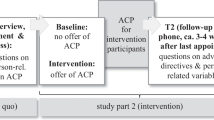Abstract
Advance patient directives are various forms of anticipatory medical directives made by competent individuals for the eventuality of future incompetence. They are therefore appropriate instruments for competent patients in the early stage of Alzheimer's disease to document their self-determined will in the advanced stages of dementia. Theoretical objections have been expressed against the concept of advance patient directives (problems of authenticity and identity) which, however, cannot negate the fundamental moral authority of advance patient directives. Therefore, patients, family members, and physicians should make use of the appropriate form of advance directive as part of common treatment and care planning. Advance directives, when utilized intelligently, represent appropriate instruments for shared decision-making by patient, family members and physician. They should be utilized to a greater extent, particularly for the treatment planning of demented patients.
Similar content being viewed by others
References
Appelbaum, P.S. and T. Grisso: 1988, 'Assessing Patients' Capacities to Consent to Treatment', New. Engl. J. Med. 319, 1635–1638.
Berliner Ärztekammer: 1999, 'Berufsordnung der Ärztekammer Berlin', Berliner Ärzte 6/99, 25–35.
Brock, D.W.: 1993, 'A proposal for the Use of Advance Directives in the Treatment of Incompetent Mentally Ill Persons', Bioethics 7, 247–256.
Buchanan, A.E. and D.W. Brock: 1989, Deciding for Others: The Ethics of Surrogate Decision Making. Cambridge: Cambridge University Press.
Bundesärztekammer: 1998, 'Grundsätze der Bundesärztekammer zur ärztlichen Sterbebegleitung', Dt. Ärztebl. 95, C1690–1691.
Bundesministerium der Justiz: 1994, Das neue Betreuungsgesetz.Bonn: Bundesministerium der Justiz, 5. edition.
Dresser, R.: 1995, 'Dworkin on Dementia. Elegant Theory, Questionable Policy', Hastings Cent. Rep. 25 (6), 32–38.
Drickamer, M.A. and M.S. Lachs: 1992, 'Should Patients with Alzheimer's Disease be Told Their Diagnosis?', New Engl. J.Med. 326 (14), 947–951.
Dworkin, R.: 1986, 'Autonomy and the Demented Self', Milbank Quart. 64 (Suppl. 2), 4–16.
Eisenmann, M. and J. Richter: 1999, 'Relationships Between Various Attitudes Towards Self–Determination in Health Care with Special Reference to an Advance Directive', J. Med.Ethics 25, 37–41.
Emanuel, L.: 1994, 'Appropiate and Inappropiate Use of Advance Directives', J. Clin. Ethics 5, 357–360.
Erde, E.L., E.C. Nadal and T.O. Scholl: 1988, 'On Truth Telling and the Diagnosis of Alzheimer's Disease', J. Fam. Prac. 26, 401–406.
Faden, R.R. and T.L. Beauchamp: 1986,A History and Theory of Informed Consent. New York: Oxford University Press.
Finucane, T.E., B.A. Beamer, R.P. Roca and C.H. Kawas: 1993, 'Establishing Advance Directives with Demented Patients: A Pilot Study', J. Clin. Ethics 4 (1), 51–54.
Fuchs, T.: 1995, 'Auf der Suche nach der Verlorenen Zeit – Die Erinnerung in der Demenz', Fortschr. Neurol. Psychiat. 63, 38–43.
High, D.M.: 1987, 'Planing for Decisional Incapacity. A Neglected Area in Ethics and Aging', J. Am. Geriat. Soc. 35, 814–820.
Johnston, S.C., M.P. Pfeifer and R. McNutt for the End of Life Study Group: 1995, 'The Discussion About Advance Directives. Patient and Physician Opinions Regarding When and How it Should be Conducted', Arch. Intern. Med. 155, 1025–1030.
Kitword, T.: 1993, 'Person and Process in Dementia', Int. J.Geriat. Psychiat. 8, 541–545.
Koch, H.G.: 1996, 'Die Wertigkeit der Prospektiven Dokumentation', in: F. Anschütz and H.L. Wedler HL (eds.), Suizidprävention und Sterbehilfe. Berlin: Ullstein Mosby, pp. 227–233.
Koch, H.G., S. Reiter–Theil and H. Helmchen (eds.): 1996, Informed Consent in Psychiatry. European Perspectives of Ethics, Law and Clinical Practice. Baden–Baden: Nomos.
Kuczewski, M.G.: 1994, 'WhoseWill Is It, Anyway? A Discussion of Advance Directives, Personal Identity, and Consensus in Medical Ethics', Bioethics 8, 27–48.
Meran, J.G.: 1997, 'Patientenverfügungen aus ärztlicher Sicht', Wiener Med. Wschr. 147, 117–120.
Miles, S.H., R. Koepp and E.P. Weber: 1996, 'Advance End–of–Life Treatment Planning. A Research Review', Arch. Intern. Med. 156, 1062–1068.
Olick, R.S.: 1991, 'Approximating Informed Consent and Fostering Communication: The Anatomy of an Advance Directive', J. Clin. Ethics 2, 181–189.
Parfit, D.: 1984, Reasons and persons. Oxford: Oxford University Press.
Reifler, B.V., E. Larson and R. Hanley: 1982, 'Coexistence of Cognitive Impairment and Depression in Geriatric Outpatients', Am. J. Psychiat. 139, 623–626.
Rieger, H.J.: 1995, 'Das “Sterbehilfe”–Urteil des Bundesgerichtshofs vom 13.9.1994', Dtsch. Med. Wschr. 120, 341–344.
Schiff, R., C. Rajkumar and C. Bulpitt: 2000, 'Views of Elderly People on LivingWills: Interview Study', BritishMed. J. 320, 1640–1641.
Schöne–Seifert, B.: 1996, 'Medizinethik', in: J. Nida–Rümelin (ed.), Angewandte Ethik. Die Bereichsethiken und ihre theoretische Fundierung. Ein Handbuch. Stuttgart: Kröner, pp. 553–648.
Sunderland, T. and R. Dukoff: 1997, 'Informed Consent with Cognitively Impaired Patients: An NIMH Perspective on the Durable Power of Attorney', in: A.E. Shamoo (ed.), Ethics in Neurobiological Research with Human Subjects. Amsterdam: Gordon and Breacher, pp. 229–238.
Vollmann, J. and I. Knöchel–Schiffer: 1999, 'Patientenverfügungen in der klinischen Praxis', Med. Klin. 94, pp. 398–405.
Vollmann, J.: 2000, Aufklärung und Einwilligung in der Psychiatrie.Ein Beitrag zur Ethik in der Medizin. Monographienreihe aus dem Gesamtgebiete der Psychiatrie. Darmstadt: Steinkopff.
Warren, J.W., J. Sobal, J.H. Tenney, J.M. Hoopes, D. Damron, S. Levenson, B.R. deForge and H.L. Muncie: 1986, 'Informed Consent by Proxy. An Issue in Research with Elderly Patients', New Engl. J. Med. 315, 124–128.
Author information
Authors and Affiliations
Rights and permissions
About this article
Cite this article
Vollmann, J. Advance directives in patients with Alzheimer's disease; Ethical and clinical considerations. Med Health Care Philos 4, 161–167 (2001). https://doi.org/10.1023/A:1011491100267
Issue Date:
DOI: https://doi.org/10.1023/A:1011491100267




